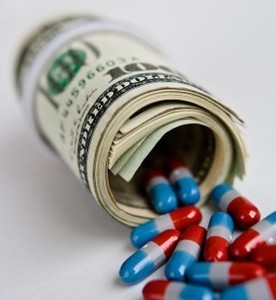The US Federal Trade Commission (FTC) is looking to collect more than US$1 billion from a settlement with pharmaceutical companies it has sued for their part in what the FTC terms ‘pay-for-delay’ deals.
FTC believes that deals in which brand-name drug companies pay generic drug companies challenging patents to delay the introduction of lower-cost medicines are anticompetitive and cost ‘consumers and taxpayers US$3.5 billion a year in higher drug prices’ [1].
Ms Deborah Feinstein, Director of FTC’s Bureau of Competition, told at the American Bar Association’s spring antitrust meeting that FTC hoped to ‘get a billion-dollar settlement in one of the patent-settlement, pay-for-delay cases’.
According to FTC’s Annual Highlights 2013 Report, which was presented at the meeting by FTC Chairwoman Edith Ramirez, the Commission is preceding with its litigation against AbbVie and two generics manufacturers concerning AndroGel (testosterone gel). FTC is charging that the companies agreed that the generics makers would abandon their patent challenges relating to AndroGel and delay for nine years the marketing of a generic formulation of the testosterone replacement drug in return for payments.
The decision to proceed follows the US Supreme Court’s ruling in June 2013 that pay-for-delay agreements are subject to antitrust scrutiny, thus reversing a lower court dismissal in the FTC versus Actavis case [2].
The FTC report also highlighted the fact that the Commission has continued to review pharmaceutical mergers during 2013. This, FTC says, is in order to preserve competition for generics as well as emerging treatments. FTC gave as an example Mylan’s proposed US$1.85 billion acquisition of Agila Specialties. FTC alleged that the acquisition would likely reduce competition substantially for 11 generic injectable drugs used to treat a variety of medical conditions, including several types of paediatric cancers, autoimmune diseases, severe hypertension and urinary tract damage. FTC therefore required Mylan and Agila Specialties to divest these generic injectable drugs before allowing the merger to proceed. In a second example, FTC required Actavis to sell all rights and assets of four generics to resolve charges that the company’s proposed US$8.5 billion acquisition of Warner Chilcott would be anticompetitive.
Related article
Authorised generics implicated in pay-to-delay deals
References
1. GaBI Online - Generics and Biosimilars Initiative. Pay-to-delay deals up by 60% in US [www.gabionline.net]. Mol, Belgium: Pro Pharma Communications International; [cited 2014 Apr 4]. Available from: www.gabionline.net/Pharma-News/Pay-to-delay-deals-up-by-60-in-US
2. GaBI Online - Generics and Biosimilars Initiative. US Supreme Court backs FTC in pay-for-delay case [www.gabionline.net]. Mol, Belgium: Pro Pharma Communications International; [cited 2014 Apr 4]. Available from: www.gabionline.net/Policies-Legislation/US-Supreme-Court-backs-FTC-in-pay-for-delay-case
Permission granted to reproduce for personal and non-commercial use only. All other reproduction, copy or reprinting of all or part of any ‘Content’ found on this website is strictly prohibited without the prior consent of the publisher. Contact the publisher to obtain permission before redistributing.
Copyright – Unless otherwise stated all contents of this website are © 2014 Pro Pharma Communications International. All Rights Reserved.








 0
0











Post your comment